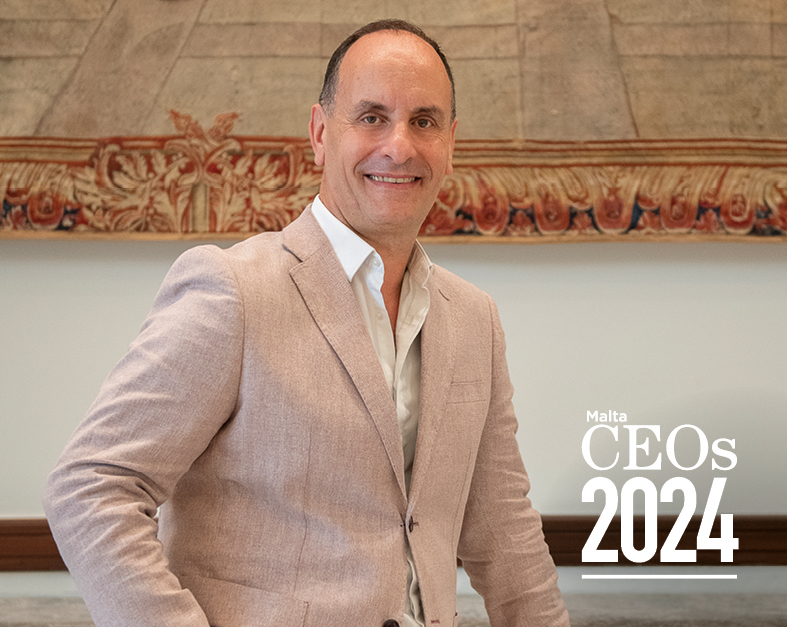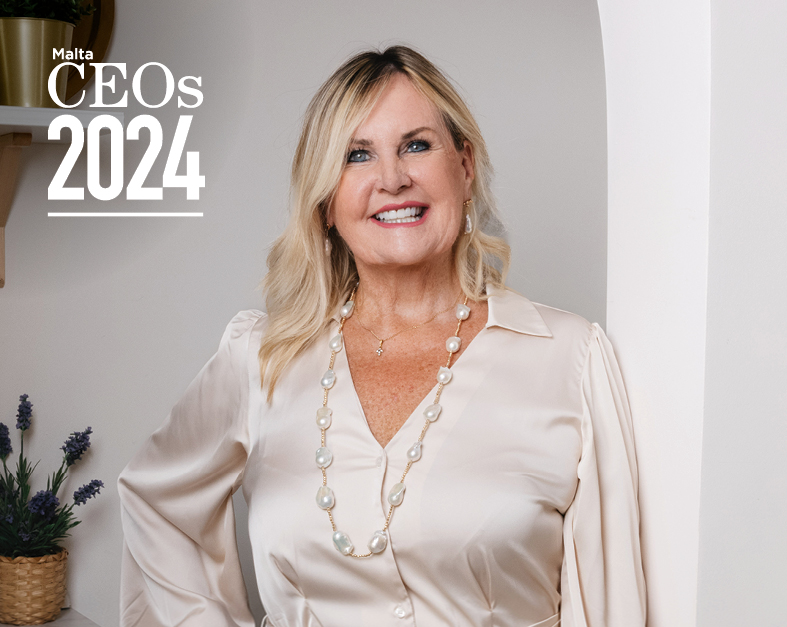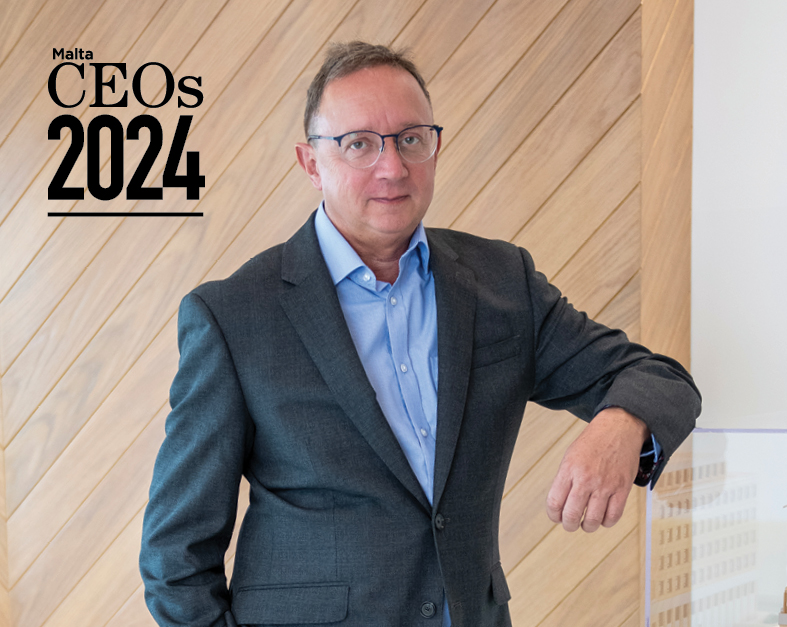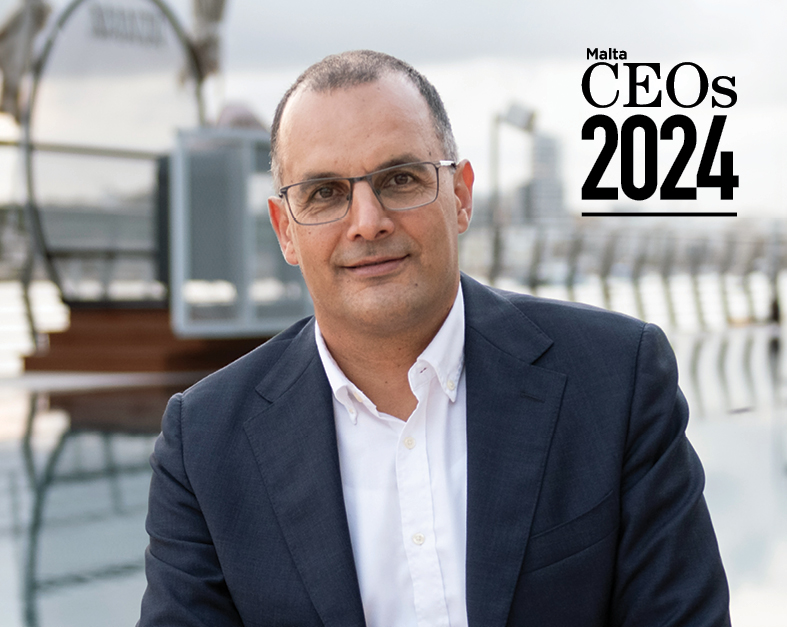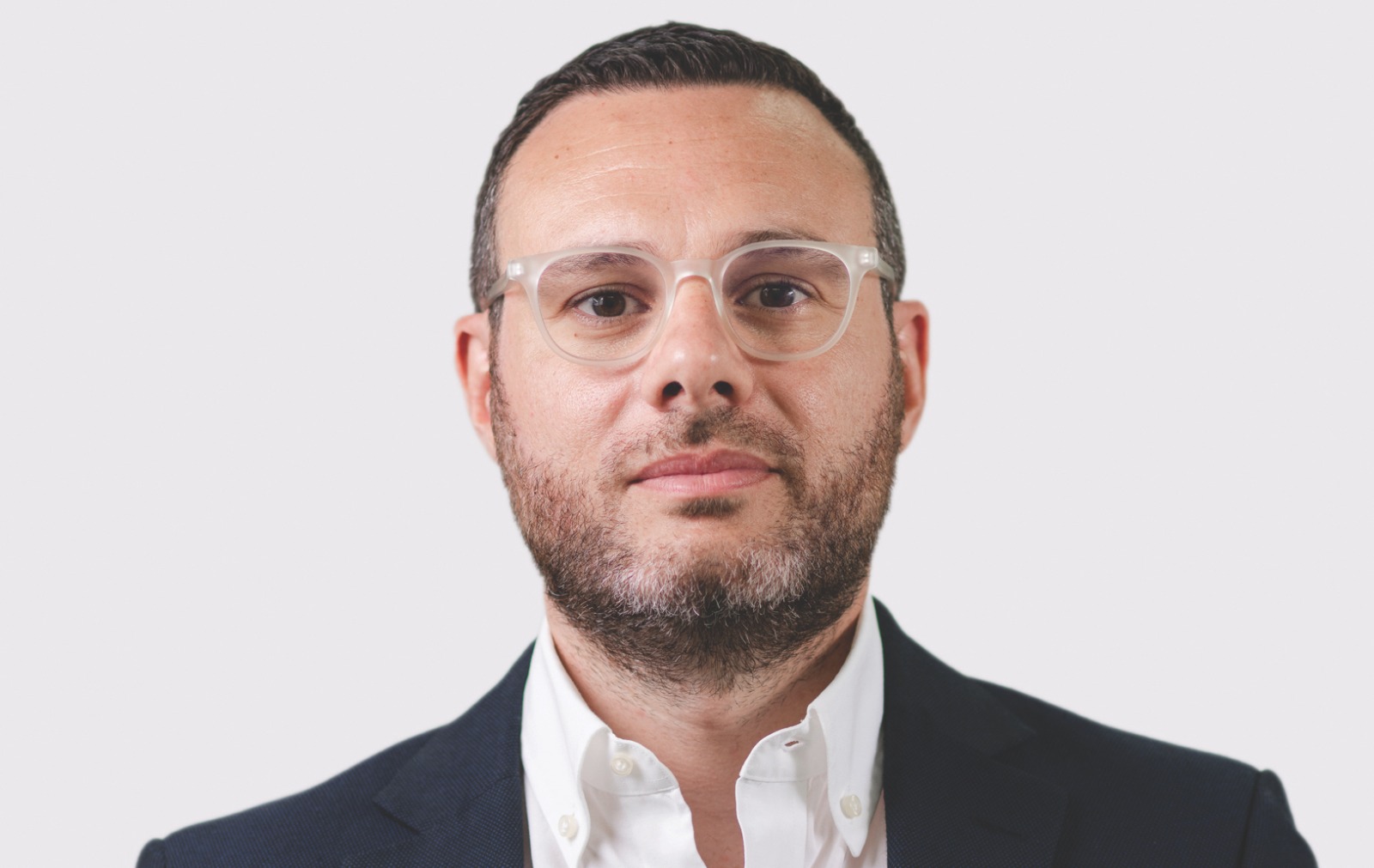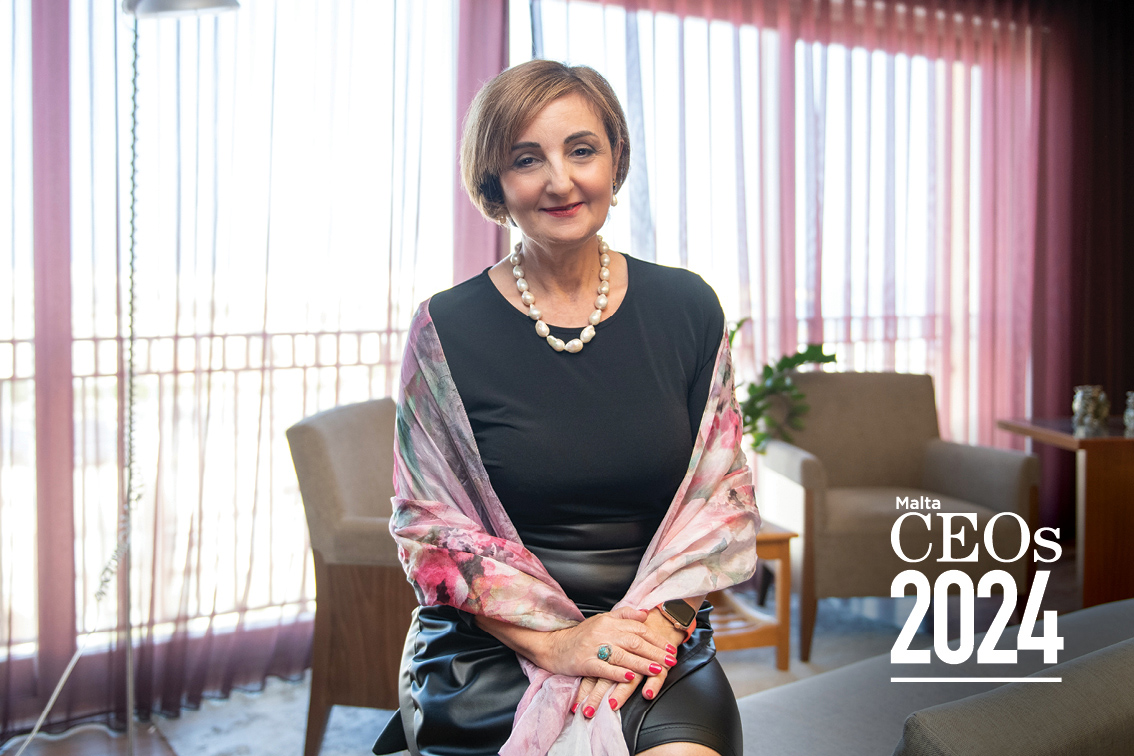Inaugurated in early 2023 after years of meticulous planning, design and construction, Trident Park emerged as a testament to visionary planning and development in Malta’s office landscape at a time when remote working was on the rise. Despite the challenges, CEO Charles Xuereb has experienced first-hand the advantages of leading with principle and developing a space that prioritises quality, sustainability and better working conditions for a more exclusive list of tenants.
Charles Xuereb’s professional trajectory hasn’t followed the typical CEO blueprint. Graduating in 1991, Charles started his career with one of Malta’s foremost accountancy firms and, by 1995, had segued into a pivotal role as the Chief Accountant at Food Chain Ltd, a subsidiary of the Farsons Group, the company responsible for managing international household brands such as Pizza Hut, Burger King, KFC, and, back then, TGI Fridays. At Farsons, Charles found more than just a job; he found a professional home. Here, he gained experience within the group’s multifaceted operations, which led to his eventual appointment as CFO in 2005, a position he served for 12 years.

As a company with a constant eye on the future, Farsons began a strategic diversification process over the last decade, leading to the creation of Trident Park plc, a distinct real estate subsidiary. This new venture aimed to transform the former Farsons brewery, a celebrated 20thcentury architectural gem, into a modern, eco-friendly office destination in the Central Business District. And, when the CEO position opened up, Charles – given his deep understanding of the project, proven financial acumen and established trust with Chairman Louis Farrugia – emerged as the natural choice to, in his words, “steer the ship” in line with the board of directors’ vision.
Discussing his shift from CFO to CEO, Charles explains: “my responsibilities as CFO at Farsons were expansive, encompassing everything from budgeting and financial reporting to IT and member services. Furthermore, as I served on the Executive Board, I also gained insight into various company functions like sales, marketing and exports. I believe that my eagerness to learn, coupled with a ‘yes I can’ mindset, ensured a relatively smooth transition.”
As CEO, Charles admits that his leadership remains deeply rooted in financial precision and transparency; values he also attributes to the ‘above board’ culture that was always at the forefront at Farsons.
“Profit isn’t a dirty word. It’s the lifeblood of any business,” he asserts candidly. “In that regard, I am known to be a tough negotiator who pulls no punches in ensuring we secure optimal deals. However, I also believe that an honest and ethical approach is fundamental in any business dealings. Being a warranted accountant is something close to my heart; I am always conscious of safeguarding my reputation by operating with absolute integrity.”

Such exacting standards have also become the hallmark of Trident Park. Since its launch in January 2023, the development has garnered praise for its innovative approach and commitment to sustainability, striking a harmonious balance between space, landscape and architecture. The vision for Trident Park was seeded as early as 2000, long before the rejuvenation of the Central Business District had even commenced. And while it has been a long time coming, the results speak for themselves.
“The vision for Trident Park was to create an environment that blended heritage with modernity, targeting the next generation of entrepreneurs and international organisations attracted to doing business in Malta. This space was designed to foster commerce while also valuing culture and acknowledging the region’s industrial history,” Charles highlights.
Designed by the internationally acclaimed Ian Ritchie Architects, Trident Park has retained several standout features from the original building’s storied past, such as the 1950 Art Deco colonnade, the grand reception and the original boardroom. The contemporary design introduces seven distinct blocks interspersed with six courtyards, providing the building’s tenants with fresh air, shade and sunlight throughout their working day.
Over and above its appealing low-rise aesthetic, the development is making a steadfast commitment to sustainable functionality by maximising natural light and air flow to diminish reliance on utilities and energy consumption. The adoption of advanced green technologies – from chilling the very fabric of the building with a flow of cooled water to innovative methods for ventilation – further underscores Trident Park’s ecofriendly credentials as it pursues the BREEAM Excellent certification, a gold standard of assurance that a building demonstrates the highest levels of quality, performance and sustainability.
“One of our boldest decisions was to build on just 43 per cent of the site, leaving 57 per cent untouched,” he says. “From a financial perspective, that’s potential revenue from additional office space that we’ve left on the table. But, after careful thought, we intentionally chose this different path. We wanted to create an office campus that aspired to be an inspiring work environment first and foremost, rather than filling every available square metre of space. Looking towards the wider sector, it’s disheartening to see developments prioritise making money at the expense of our environment and heritage. More needs to be done among developers to find a balance between profitability and respecting our surroundings.”

Attracting the right tenants is crucial for any thriving business destination, and Charles and his team have been particularly scrupulous when onboarding tenants, ensuring utmost due diligence to safeguard the reputation of the campus. During its first year of operation, Trident Park enjoyed a remarkable 77 per cent occupancy. Its tenants range from the EUAA and banking firms to Forex and gaming entities, soft service providers, and budding creative startups.
In addition to the prime office space, tenants also benefit from a variety of top-tier amenities. They can dine at eateries like Vecchia Napoli, Kettles, The Cisk Tap, and The Chapels gastropub. There’s a childcare facility for working parents, a state-of-the-art gym and healthcare options, including a dental and medical clinic. Meanwhile, the on-site Farsons Brewery Experience is the ideal spot for tenants to provide international guests visiting Malta with a fascinating insight into a national icon.
Managing such an expansive campus is no small feat, but Charles and his tight-knit team are handling operations with efficiency and professionalism. “I’ve always favoured a lean team,” Charles confesses, attributing this to his accounting mindset. “I’m open to expanding our resources, but only if it adds genuine value. Waste is something I hate with a passion.”
In an age when remote work is becoming the norm, one might assume that it would be a struggle to lease new office spaces. Yet, from his experience, Charles has come to see this shift in the post-pandemic world as more of an advantage for Trident Park than a setback.
“Businesses are embracing remote and hybrid working nowadays,” he admits. “While this might mean they require less physical space, it has also resulted in companies looking for more premium offices like Trident Park, where they can offer their people a more inspiring setting to work from with better facilities. From the level of enquiries we receive, there is still a significant number of businesses wanting to upgrade their office space in Malta.”
Following a successful first year of operations, Charles asserts that the primary objective going forward is to achieve 100 per cent occupancy and fine-tune operations around the campus even further. While there have already been whispers about the possibility of a second Trident Park, Charles emphasises the importance of strategic decision-making aligned with the board’s vision.
“We have raised the bar with Trident Park, setting a new standard for what innovative and eco-friendly office campuses can aspire to in Malta. Whatever the future holds, our commitment remains to prioritise quality development, because whatever we build today needs to stand the test of time and serve Malta’s business community for generations to come,” Charles concludes.
This article is part of the serialisation of 50 interviews featured in MaltaCEOs 2024 – the sister brand to MaltaCEOs.mt and an annual high-end publication bringing together some of the country’s most influential business leaders
‘My goal is to position Harbour Solutions so that it gives peace of mind to our customers’ – CEO Ruben Curmi
At the heart of Ruben’s ethos lies a strong commitment to quality and innovation.
How to build influential connections in Malta and beyond: Seed’s JP Fabri
Reignited in the post-pandemic world, networking has never been more pivotal.
‘In any knowledge-based entity, its people are key’ – Business First CEO Marika Tonna
Marika believes that a good entrepreneur will always turn a challenge into an opportunity.
How to build influential connections in Malta and beyond: Media Insiders’ Ariadne Massa
In this feature, we tap into C-Suite heavyweights for their fresh takes on making connections that count.


